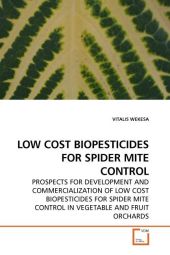 Neuerscheinungen 2010Stand: 2020-01-07 |
Schnellsuche
ISBN/Stichwort/Autor
|
Herderstraße 10
10625 Berlin
Tel.: 030 315 714 16
Fax 030 315 714 14
info@buchspektrum.de |

Vitalis Wekesa
LOW COST BIOPESTICIDES FOR SPIDER MITE CONTROL
PROSPECTS FOR DEVELOPMENT AND COMMERCIALIZATION OF LOW COST BIOPESTICIDES FOR SPIDER MITE CONTROL IN VEGETABLE AND FRUIT ORCHARDS
2010. 120 S. 220 mm
Verlag/Jahr: VDM VERLAG DR. MÜLLER 2010
ISBN: 3-639-23455-3 (3639234553)
Neue ISBN: 978-3-639-23455-8 (9783639234558)
Preis und Lieferzeit: Bitte klicken
Fungal Biocontrol: The growing emphasis on environmental and food safety issues has intensified interest in the development of biological control as a means for controlling pests. Biocontrol offers an attractive alternative to the use of chemical pesticides in crop protection. The effective use of natural enemies in biological control programs is contingent upon understanding their ecology and that of their targets as well as their interaction with production practices. Diseases form an important component of the natural enemy complex of spider mites and can be exploited for their control. Introduction of exotic diseases for classical biological control of exotic pests is sometimes inevitable and these pathogens need to be augmented. However, success of this option depends on effective strain selection, production and release technologies to be used. The process of strain selection involves survey and collection from different places followed by pathobiological studies. This work addresses each of the biological control aspects noted above and places them in the overall context of controlling spider mites with the fungal pathogen, Neozygites floridana Weiser & Muma.
Works with Norwegian Institute of Agricultural and Environmental Research (Bioforsk). He holds a Bachelors degree in Biology and a Masters Degree in Microbiology from Jomo Kenyatta University of Agriculture & Technology (JKUAT), Kenya. He Has a Doctorate in Agricultural Entomology from the Universidade de SÆo Paulo (USP), Brazil.


